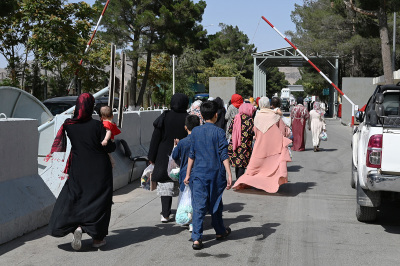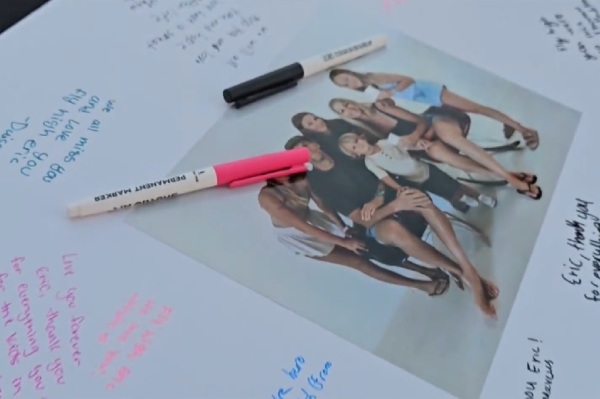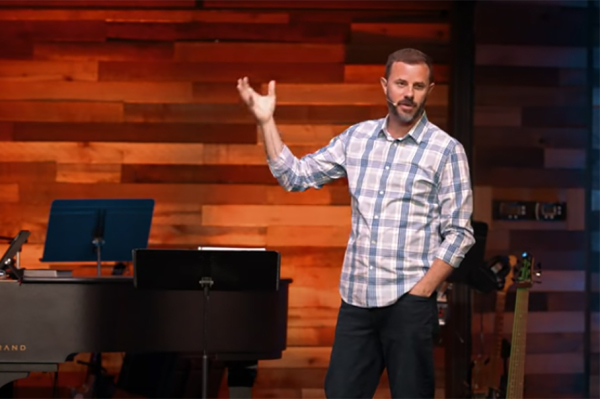Embracing the moral imperative: A global model to support the displaced
One week before her tragic death, Sergeant Nicole Gee tenderly embraced an innocent infant. We don’t know this child’s name or story, but we do know why Sergeant Gee dared to support – “I love my job.” These are the words she wrote one week prior to a suicide bomber
selfishly taking her life. But what this cowardly act can never eradicate is the thing that propelled Sergeant Nicole Gee to serve – love. What then is this virtue that summoned her to support and defend the Constitution from all enemies, foreign, and domestic?

The Greeks translate this term in the following ways: Eros, Philia, and Agape. Eros relates to romance or a form of expression between a wife and husband. Philia describes a bond between friends. This form of affection is often experienced amongst colleagues and our networks. Agape, and its verb form agapao, is a self-sacrificing love that results in the ultimate sacrifice. Stated differently, agape says greater love is this, that a person lays down their life for a friend. Dr. Bruce Winston describes agapao as love in “a social or moral sense, embracing the judgment and the deliberate assent of the will as a matter of principle, duty, and propriety.” Plainly put, agapao is doing the right thing, at the right time, and with the right motives.
The Right Thing
Regarding the 20,000 Afghan evacuees in the United States and 40,000 in other parts of the globe, what is the right thing? Before a plausible response is offered, consider first their story. They built homes, but they can never return to live. They dream of a better life for their children, but a nightmare has challenged their hopes. They were not Americans yet for two decades they supported United States military operations. Why? Because they believed it was a moral imperative. This strongly felt principle compelled the displaced to act on our behalf even in the face of grave danger.
What about us? How should the globe respond to this moment? The parable of the Good Samaritan provides us with an international framework. A certain man, as the story goes, was attacked by robbers, and left half dead in the middle of a road. Two esteemed people walked down that same street at different times and decided to support the status quo and do nothing. As fate would have it, a Samaritan showed up and refused to allow another human being to suffer.
This man of modest means had: The compassion to connect. Seemingly when this Samaritan saw a stranger in distress, it reminded him of his previous predicaments. No doubt, he recalled the moments in life when he was in need and others simply walked by. This was his moment to pay forward the thing he wished he received. How does one acquire this mindset? Dr. Martin Luther King Jr. reminds us that, “You don’t have to make your subject and verb agree to serve. You only need a heart full of grace. A soul generated by love.”
2. The courage to care. There are various forms of valor. But the one that often requires the most mettle is the courage to be concerned. Let’s face it, exercising empathy is a risk. One can jeopardize social standing, personal comforts, and yes even safety when one breaks from conventional norms to do what is right. But there is also a consequence of shrinking back from the moment. Emotions of regret, moral injury, and perpetual fear will keep us from
experiencing life in its fullest capacity.
3. The commitment to create opportunities. It wasn’t enough for this Samaritan to be compassionate and display courage. This neighbor made a commitment to get the wounded man back on his feet. He used his own means to provide for his health, living arrangements, and he set him up for future success.
In a similar fashion, the international community has a moral responsibility to demonstrate compassion, courage, and commitment to the 60,000 Afghan evacuees. We’ve been conditioned, unfortunately, to expect someone else to solve matters of the heart. When in actuality it is the business of humanity to exercise the golden rule: Do unto others as you would have them to do unto you. But how and what does that look like?
Communities of faith should lead the charge by providing for the basic needs of our new neighbors. Not-for-profit organizations should stand up educational courses to help Afghans integrate into society. Local businesses should leverage their talents and provide those in need with the opportunities to positively contribute to society. The choice is ours. Will we walk by this moment or be a Good Samaritan?
The Right Time
The school of medicine has a term known as the “golden hour.” This is the period of time that a medical team has to care for the urgent needs of a patient in critical condition. How they respond in this timespan is the difference between life and death. For the evacuees, this is a humanitarian golden hour and now is the time to act! Dr. King would say, “We are now faced with the fact that tomorrow is today. We are confronted with the fierce urgency of now. In this unfolding conundrum of life and history, there is such a thing as being too late. This is no time for apathy or complacency. This is a time for vigorous and positive action.” To this end, let us move away from the distractions of toxic ideology, negative grandstanding, and operate with unity of effort. When this is done with a fierce urgency of now, the critical needs of the displaced can be addressed in a timely manner.
The Right Motive
Perhaps the hardest thing to detect are the motives of the heart. If one’s intentions are laced with selfishness; the outcome becomes clouded with confusion and discord. In contrast, when our motives are genuine the uplifting of the other becomes the order of the day. How
then can we assess our motives? We can start by examining our words. For it has been said that, “The power of our words are crafted by the motives of our heart.” If this is true, we should examine what we say about the other when we are under pressure or we feel safe enough to speak freely. Let us ask ourselves during these times, what are we really saying about the evacuees? Do such words align with our core values and how does this motivation contribute to positive change?
Conclusion
At the end of the day, some 60,000 Afghan evacuees are in need. This number may seem overwhelming at first glance and may cause the average person to pause. If this is true, let us remember Sgt. Nicole Gee’s sacrifice. She made the choice to become a United States Marine. From this platform she had the honor of serving during Operation Allies Refuge. It was within this mission that this Marine embraced a child whom she never met and served unconditionally. Why? Because of Agapao. May the memory of Sergeant Nicole Gee, and her fellow service members, never be forgotten. And, may the global community embrace the moral imperative to serve as a Good Samaritan.
Captain Maurice A. Buford currently serves as the U.S. Naval Forces Central Command Force Chaplain in Bahrain. He is a 1993 student-athlete and graduate of Tuskegee University with a Bachelor of Science in Sociology. In 1997 he received his Master of Divinity from the Interdenominational Theological Center. In 2006 he went back to the Interdenominational Theological Center and earned a Doctorate of Ministry with a focus in pastoral care and counseling. In 2012, he received his Ph.D. in Organizational Leadership from Regent University.





















